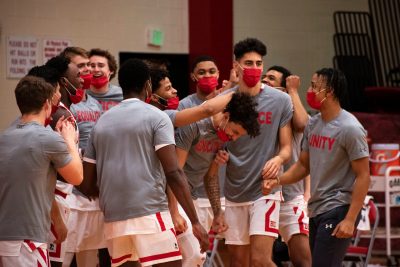The Boston University College of Communication and Alumni Association hosted a discussion Wednesday that was centered on the intersections between sports and race following anti-racism momentum from professional athletes such as Lebron James and Colin Kaepernick.
Throughout the discussion — titled “Sports and the Work of Antiracism” — the event’s panelists and moderator touched on subjects such as working in sports journalism, coaching and playing sports as a person of color.

The webinar featured moderator A. Sherrod Blakely, a lecturer in COM, as well as two panelists: BU’s women’s head basketball coach Marisa Moseley and ESPN senior vice president and editor-in-chief of “The Undefeated” — an ESPN platform that explores the intersectionality of race, culture and sports — Kevin Merida.
The webinar focused on the panelists’ experiences in the sports field and how they achieved the positions they are in today. Blakely led the discussion, and attendees were given the opportunity to ask questions toward the end of the webinar.
Both panelists are BU alumni and have continued to be involved in the BU community. Moseley, who became head coach of women’s basketball in April 2018, graduated from the College of Arts and Sciences in 2004 after a successful basketball career with the Terriers as a two-time captain. Moseley also serves as a founding member on the Patriot League Anti-Racism Commision. Merida graduated from COM in 1979 and has since served on the BU Board of Trustees.
Blakely teaches a course on sports journalism at BU and serves as the chair of the National Association of Black Journalists’ Sports Task Force — a team that works for more equality in sports departments and helps to support Black journalists.
When it comes to her team, Moseley said she takes her role as a leader seriously, seeing it as a way to help her players learn and grow outside of the court.
“As a leader, I look at it as I’m a professor on the court,” Moseley said. “I really believe that we all have platforms because we all have voices and we all have the opportunity to have conversations. That’s our responsibility.”
As a successful leader in the communications field, Merida said he sees his role as a way to help the community become more anti-racist — his platform is a way to shed light on the experiences of POC.
“The thing I can do as a leader is to, first of all, tell untold stories,” Merida said. “Have people see us better, not see just a corner of the world, but all of it.”
Blakely said he wanted attendees to come away with an understanding of how to become a better anti-racist ally.
“For some people who don’t really have a feel for the correlation between anti-racism and sports, I want them to have clarity on what makes sense to them and why this is important,” Blakely said in an interview. “For those who are a little bit further along the road in that regard, I want them to come away with tips, ideas and strategies that can help them even more so than they already are.”
Becoming anti-racist isn’t a one-and-done deal — Blakely said it is a process that takes a lot of time and energy to create sustainable actions.
“I don’t believe that there’s one webinar or seminar or series or conversation that’s going to be that game-changer, but it has to be a cumulative thing,” Blakely said. “Racism is never going to end unless you start chipping away at it and being diligent in that process.”
Blakely said although these conversations can be uncomfortable, they are important in creating change and a better society, including in sports. Conversations such as these are vital to the process of being anti-racist.
“The theme of sports and antiracism,” Blakely said, “it involves, in many respects, learning how to be comfortable with being uncomfortable, willing to have those conversations that, frankly, are needed and necessary that we don’t have enough of in our society.”














